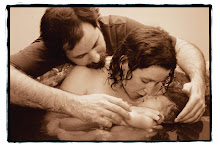Well, finally a well-respected organization is calling BS on this (read the full article here) for low risk women:
NEW YORK (Reuters Health) - There is no reason why pregnant women at low risk for complications during delivery should be denied fluids and food during labor, a new Cochrane research review concludes.
..."Women should be free to eat and drink in labor, or not, as they wish," the authors of the review wrote in the Cochrane Library, a publication of the Cochrane Collaboration, an international organization that evaluates medical research....
...Standard hospital policy for many decades has been to allow only tiny sips of water or ice chips for pregnant women in labor if they were thirsty. Why? It was feared, and some studies in the 1940s showed, that if a woman needed to undergo general anesthesia for a cesarean delivery, she might inhale regurgitated liquids or food particles that could lead to pneumonia and other lung damage.But anesthesia practices have changed and improved since the 1940s, with more use of regional anesthesia and safer general anesthesia...
...And recently, attitudes on food and drink during labor have begun to relax. Last September, the American College of Obstetricians and Gynecologists (ACOG) released a "Committee Opinion" advising doctors that women with a normal, uncomplicated labor may drink modest amounts of clear liquids such as water, fruit juice without pulp, carbonated beverages, clear tea, black coffee, and sports drinks. They fell short of saying food was okay, however, advising that women should avoid fluids with solid particles, such as soup...
...Singata and colleagues systematically reviewed five studies involving more than 3100 pregnant that looked at the evidence for restricting food and drink in women who were considered unlikely to need anesthesia. One study looked at complete restriction versus giving women the freedom to eat and drink at will; two studies looked at water only versus giving women specific fluids and foods and two studies looked at water only versus giving women carbohydrate drinks.
The evidence showed no benefits or harms of restricting foods and fluids during labor in women at low risk of needing anesthesia.
...Singata and colleagues acknowledge that many women may not feel like eating or drinking during labor. However, research has shown that some women find the food and drink restriction unpleasant. Poor nutritional balance may be also associated with longer and more painful labors. Drinking clear liquids in limited quantities has been found to bring comfort to women in labor and does not increase labor complications.













2 comments:
Are the chances of having an emergency C-section really comparable to getting hit by a bus? I've definitely heard of more C-sections than I have bus accidents in the past...
http://tinyurl.com/ycvha3n
Sure, Molly - the chances of having a labor culminate in a cesarean are, possibly, higher than having a random accident (edited to add: I'm guessing here - a less less lazy/busy person might add some statistics - chime in if ya got 'em!). However, I think it's VERY important to differentiate between unplanned cesareans and true emergency cesareans. Many woman will call their unplanned cesareans "emergency" when in fact they were actually unplanned ad while there was perhaps not an easy-breezy pace, there was likely time for regional anesthesia. I have, luckily, been a part of only one true emergency cesarean in about 400 births.
As I said, the chances of needing energy for labor is 100%...and not having sufficient energy can actually lead to unnecessary cesareans if the laboring woman is unable to carry on or her labor stalls and augmentation of that labor leads to fetal distress. Avoidable cesareans (major abdominal surgeries) pose risks to moms and babies. So the extremely small risk posed by eating in labor is, in my opinion, worth it.
Coincidentally, an OB from a respected hospital in Boston recently quoted in the NY Times used a very similar example and line of reasoning to my bus idea, so I'm comfortable with my statement. I'll post this in a blog entry & try to find the NY Times article too. Thanks for your important question.
best,
Kim
Post a Comment